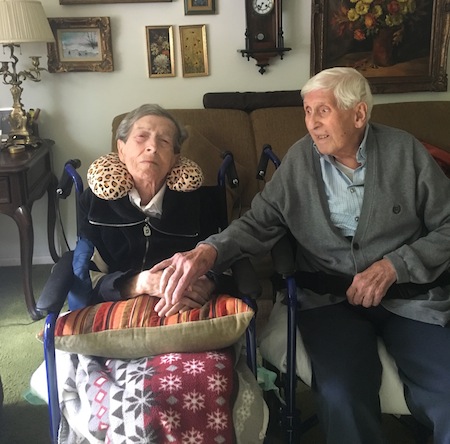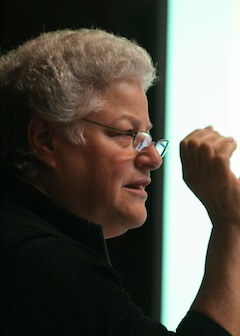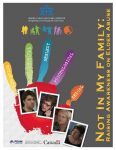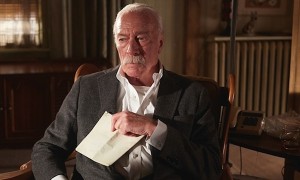Earlier this year, Winnipeg’s Jewish Child and Family Services (JCFS) premièred the short film Not in My Family, to raise awareness on the topic of elder abuse.
JCFS executive director Al Benarroch greeted the approximately 150 attendees that filled the Berney Theatre of the Asper Jewish Community Centre on Feb. 13.
“This film serves as a springboard for discussion and to help educate groups on how they might handle the issue of elder abuse,” said Benarroch. “It also provides a lot of valuable resources available in our community. Along with the film, we’ve created a kit with a booklet that provides information and also a discussion guide with some specific questions to be used following the viewing of the film. We envision this package having widespread application as a tool for organizations and professionals who work with seniors, who are educators, and other community professionals in regular contact with seniors, either individually or in groups.”
Developed by the JCFS, the project was funded by the Government of Canada’s New Horizons for Seniors Program. The 13-minute video is available from the World Elder Abuse Awareness Day Manitoba website (weaadmanitoba.ca/resources.asp?t=4), as is the accompanying resource guide.
Following the screening was a panel discussion with Jamie Kinaschuk from A & O Support Services for Older Adults Inc.; Sharon Tod, chair of the elder law section of the Manitoba Bar Association; and Dara Maternick, coordinator of Prevent Elder Abuse Manitoba.
“Every situation is different,” said Tod. “So, you have to tailor the answer to the particular problem. It’s an excellent resource to have a lawyer that you trust. The other thing I will urge you to do is make sure you have everything in place early on in the process. I’m talking about powers of attorney. Because, if you do it while you are fully competent and can assess properly who is the best person(s) to be your attorney, that is way better than what we often see in my profession, which is someone who is already in the early stages of dementia and in a vulnerable position who is then talked into appointing someone as their attorney … who is the exact wrong person for the job.”
According to Canadian research, between four and 10% of seniors are subject to some form of abuse. In addition to that, experts believe that, for every report of elder abuse, there are another four cases that are never reported. Most of the seniors who reach out for help say they are being financially abused.
Maternick said the best way to deal with the problem is through a team approach that respects the individuals and their choices. “We are proud to be here today in partnership with the JCFS to launch this valuable resource,” she told attendees. The film and its guide were highlighted at World Elder Abuse Awareness Day (June 15) events.
As Benarroch opened the discussion for audience questions, an elderly woman asked how to deal with abuse by home-care workers.
Kinaschuk suggested contacting her case supervisor, saying that, if she fails to get somewhere with that route, she can always call their supervisor. Benarroch advised that she contact the JCFS to have their social workers help guide her through the process of launching a complaint if need be.
Another audience member shared his situation. “My father’s been taken for $95,000 in the past two years, sending money to Jamaica and Dubai,” he said. “While he has been talking about giving me power of attorney, he has the full capacity to do it himself. Where would I go with that?”
Tod suggested that the son talk to his father’s lawyer, and then went on to share a story about one of her own clients. “He was at a stage where he was vulnerable, but competent, so we couldn’t force him to do things he didn’t want to,” she said. “So, I sat down with him and his son. We had a discussion.
“It’s difficult to talk about, because he was embarrassed that he had been taken for this money. But, we did, we sat down and talked about it and, ultimately, what we did was, he agreed voluntarily that his son would take over his affairs under the power of attorney, and the son took a number of steps to prevent the father from being contacted by these scam artists again.”
The steps, according to Tod, included the son changing his father’s phone number to unlisted, having all of his father’s mail redirected to his home and ensuring that his father had access to only one bank account with a limited amount of money in it, so that, if he was taken advantage of, at least the loss would be limited.
In another situation, Tod was appointed with the power of attorney, to prevent a son from threatening his mom for money. “Now, when the son came to her, she could say that she doesn’t know where her bank is anymore, that he would have to talk to her lawyer,” said Tod.
Tod spoke about capacity and how difficult it can be to determine, pointing out that it is part of a lawyer’s responsibility. “Before we have people sign documents, we have to make sure we are comfortable that the clients understand what the documents mean,” she said. “But, there are different capacity tests for different legal documents that you sign.
“It’s even difficult for doctors to determine someone’s capacity. Some doctors say someone has capacity while other doctors disagree. It also depends on the specific thing you’re looking at. People may have fairly good cognitive function, but their judgment may be impaired.”
Family members or social workers usually end up making these determinations and, if there are concerns, a doctor should be consulted.
Kinaschuk pointed out that, when the abuser is a family member, it catches one off guard. “You don’t expect a family member to be the abuser, so your guard isn’t up,” he said. “In this case, in the film, the grandson is telling grandma, ‘No, you’re wrong, you didn’t give me the money.’ And, she’s like, ‘Maybe I didn’t.’”
Even when an abuse situation is identified, Kinaschuk added, it is still very difficult to take action, as the victims come up with excuses for their abusers. “They’ll say things like, ‘He or she is having a tough time. They just need a little help until they get a job.’ And, it goes on and on. We provide support, discuss options and help them recognize what’s going on, but it is up to them to take it further.”
According to Maternick, it takes a lot for people to reach out for help. “The type of circumstance for elder abuse will be different for everybody,” she explained. “It becomes very difficult to answer these questions because you need to dig into the situation to understand what’s happening. There’s complexity with all these issues.”
Maternick suggested that a good place to start is by calling the senior support line. “The reason that line is so important is because it allows you to access information and resources to better understand what your options are,” she said. “There is no single answer that’s going to apply to every situation.”
In British Columbia, the Jewish Seniors Alliance can be reached at 604-732-1555 and a list of where to go for help, including for instances of abuse, is available at jsalliance.org/resources/where-to-go. Among the contacts listed by the JSA is the B.C. Centre for Elder Advocacy and Support’s elder law clinic (604-437-1940 or via bcceas.ca).
Rebeca Kuropatwa is a Winnipeg freelance writer.














